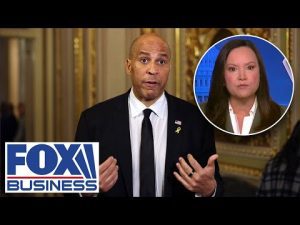The following video is brought to you courtesy of the Epic Economist YouTube Channel. Click the video below to watch it now.

“This means bad news for investors,” said Wolfenbarger during an interview with Business Insider. “That completely eliminates the main bull case that I think most investors are relying on”. The financial analyst highlighted that a perfect storm for stocks to suffer a big crash is looming on the horizon. Exceedingly high valuations increase the odds of a brutal stock market crash since stock prices will have to sharply readjust to come back down to earth. At this point, the Warren Buffett indicator, which compares stock valuations to GDP, is at an all-time high, while the Schiller price-to-earnings ratio is at levels last seen during the peak of the dot-com bubble in the late 1990s. However, behind soaring valuations is an unsustainably bullish sentiment, which Wolfenbarger as a contrarian indicator. Wolfenbarger said that the initial pullback will be of about 20 percent. But the Fed tightening will trigger a bigger sell-off, that will make the market drop by an additional 60 percent.
Similarly, Seeking Alpha’s market analyst Robbe Delaet argues that the first burst marks ‘phase one’ of the bubble collapse. And we’re now headed to phase two. In a recent article, Delaet explained why so many investors are scratching their heads about what’s going on in the stock market right now. Even though indices keep trading at all-time highs, a series of individual stocks are dramatically crashing. “Here’s the explanation,” he wrote: “The epic 2021 bubble, which I have been warning for several times, has already collapsed,” he says. However, due to the very specific characteristics of a bubble collapse, the indices continued rallying, but as we enter phase two, that’s about to change. The first part of the 2021 bubble burst began with the collapse of small-cap and meme stocks.
The first bubble to pop was fueled by a new wave of investors, mostly millennials who have no concern about valuations and see no problem in taking huge amounts of risk, the analyst explains. Many of those new investors still believe that these high growth rates are going to persist for many years. But “following the herd by buying hyped stocks can be a very costly mistake which I strongly discourage investors to do,” Delaet warns. This group of investors loved to pour giant piles of money into extremely expensive hype stocks. But as companies started to release their growth reports based on real economic prospects, these hyped small-cap stocks have been hit by an outlook of little to no revenues in the near term. During the dot-com bubble, the exact same thing happened. Several unprofitable, hyped small-cap stocks aggressively dropped in 1999, but it took until March 2000 for the general Nasdaq Index to peak and then fatally crash.
It is in phase two that we will see growth stocks plunging to record-lows while the tech bubble burst finishes its course. Most of the new investors thought that growth stocks provided similar potential with lower risks. That could be true if the economy was stable enough to support growth. But that’s not the case right now. This year, the amount of money that went into these stocks was so mind-blowing that many of them gained hundreds of percentages points. “As a consequence of valuations having grown to unsustainable levels, these investments became extremely risky as well. As valuation risks became unbearable and macro-economic challenges increased, this asset class started to sell off significantly in November,” he wrote.
All signs are point to an imminent disaster, or as Wolf Richter from wolfstreet.com has put it: “This market doesn’t need more alarm bells – they’re already clanging and jangling all over the place.” This extremely over-valued stock market is currently capitalizing on an economy that might exist by the year 2060, but not today. Leverage is starting to fade as companies report their declining quarterly earnings. And Fed tapering is only the tip of the iceberg for the stock market. Many problems are lying under the surface, and the truth is that the financial system is terminally broken. At this point, a stock market crash is not only a matter of logic but of gravity. Buyers beware.
https://www.epiceconomist.com”



